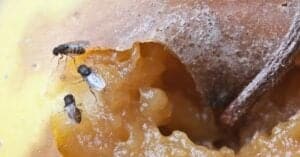As the summer turns to fall and the weather begins to cool, you may notice a distinct lack of fruit flies in your kitchen. While they may have been a constant presence during the warmer months, their disappearance in the winter is a mystery to many.
So where exactly do they go, and how do they manage to make it through the winter? Let’s explore the fascinating world of fruit flies and their winter survival strategies.
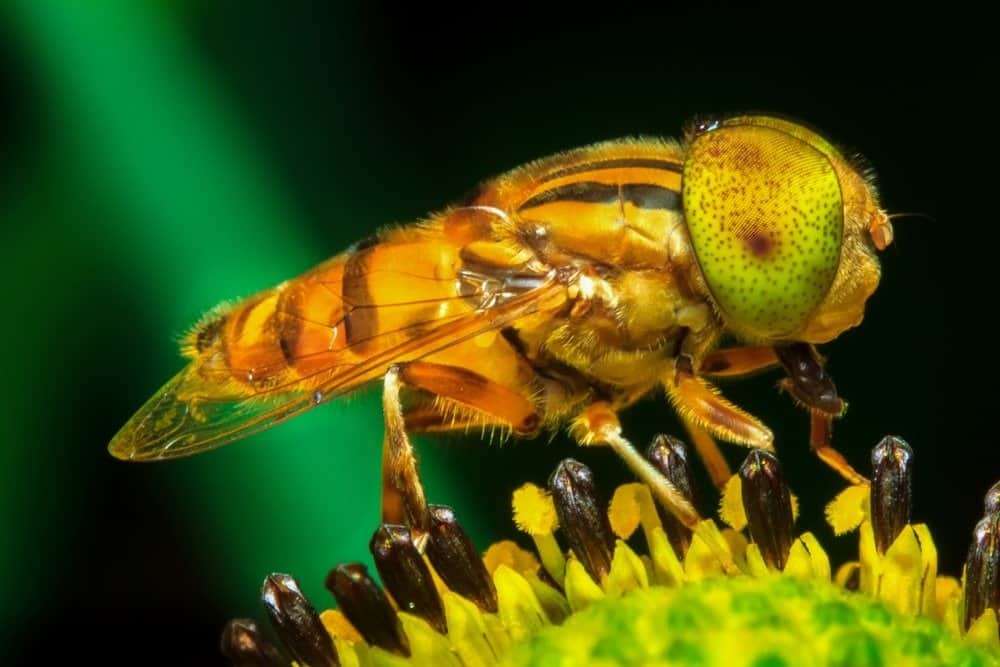
Fruit flies are small
insects
belonging to the Drosophilidae family.
©Factory_Easy/Shutterstock.com
What Are Fruit Flies
Fruit flies are small insects belonging to the Drosophilidae family. They are typically less than 1/8 inch long, with a tan or brown body and red eyes. While they are often considered a nuisance, fruit flies are fascinating creatures. They have adapted to thrive in a wide range of environments.
As their name suggests, fruit flies feed on fruit and other sugary substances. They are particularly attracted to overripe or decaying fruit and fermenting liquids such as vinegar or alcohol.
Fruit flies are found all over the world in a wide range of habitats. They are particularly common in areas with abundant fruit or decaying organic matter. They prefer places like compost piles, garbage cans, and drains. However, they can also be found in homes, particularly in areas where fruit or vegetables are stored. Fruit flies have a short life cycle, typically living for only a few weeks. They can lay up to 500 eggs during their lifetime, which hatch into larvae within 24-30 hours. The larvae feed on the fruit or other organic material in which they were laid. They then pupated before emerging as adult fruit flies.
Adaptability
Fruit flies are known for their ability to adapt to changing environments. They have a remarkable ability to quickly reproduce and adapt to new food sources. This has helped them become one of the most successful species on the planet.
Contrary to popular belief, fruit flies can be quite helpful insects. Rather than being a nuisance, they serve an important ecological purpose by consuming decaying matter. Without these tiny insects, the rotting material would linger and possibly lead to harmful fungal or bacterial infections. Furthermore, it could also attract unwanted pests such as rats and mice.
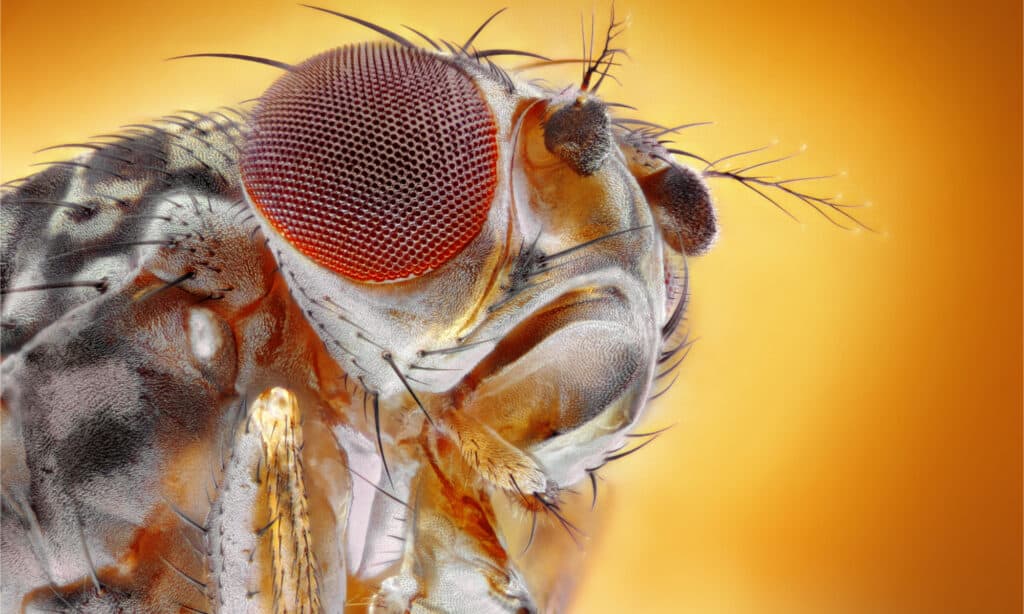
One of the reasons that fruit flies are so difficult to get rid of is that they reproduce very quickly.
©Tomatito/Shutterstock.com
Do Fruit Flies Migrate?
Fruit flies are not known to migrate over long distances like other species of insects or animals. Instead, they are typically found within a relatively small area, often staying close to the source of decaying organic matter that they feed on.
However, fruit flies are capable of traveling short distances in search of food and suitable breeding sites. They can also be unintentionally transported over longer distances through human activities, such as stowing away on fruits or vegetables that are being transported or shipped.
Why Don’t Fruit Flies Migrate?
There are a number of reasons. First, fruit flies are small insects with limited flying capabilities, which makes it difficult for them to undertake long-distance flights.
Second, fruit flies have a short lifespan, typically living for only a few weeks, which means that they do not have enough time to undertake long migrations.
Moreover, fruit flies are typically found in environments with ample food and breeding sites, such as rotting fruits and vegetables, which are readily available and abundant in their local habitat. This reduces the need for them to migrate to other areas in search of food or suitable breeding sites.
Additionally, since fruit flies are primarily found in human settlements, they do not need to migrate to other areas for seasonal changes in climate, as they can adapt to different environments found within human habitats.
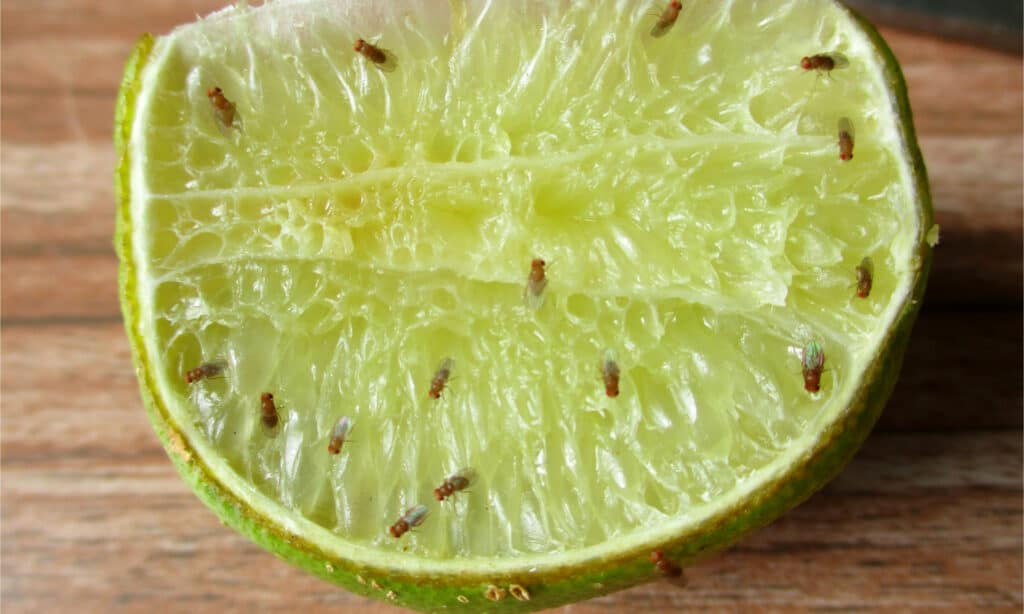
Fruit flies are typically found in environments with ample food and breeding sites, such as rotting fruits and vegetables.
©SUPAPORNKH/Shutterstock.com
Where Do Fruit Flies Go In The Winter?
It turns out these little pests have quite a few tricks up their sleeve to survive the cold.
Some of them are perfectly content living in and around garbage all year long and will simply hunker down in sheltered areas during winter to preserve heat.
However, if you’re still spotting fruit flies in your home during the winter, it could be because your cozy indoor heating is also keeping them comfortable. While they can’t survive outdoors in the cold, they can flourish indoors as long as the temperature is warm and toasty. In fact, your home might just be the perfect environment for these pesky critters. Allowing them to continue feeding and breeding all winter long.
While fruit flies may be able to survive in warmer indoor temperatures, the cold can still have an impact on their development and lifespan. Studies have shown that when the temperature drops below 45 degrees, these insects become inactive; below 32 degrees, they simply can’t survive.
So, while some fruit flies may be cozy in your home during the winter, the cold weather is still doing its part to keep their population in check.
What Do Fruit Flies Do In The Winter?
Some of these insects die off in the cold weather, leaving behind their offspring in the ground. These grubs remain dormant during the winter and hatch in the spring. Others, however, opt to seek out warm places to spend the winter, like tree holes, caves, or, most probably, human dwellings.
When they find a warm spot, fruit flies typically go into a state of diapause. Which, is not exactly the same as hibernation, but rather a period of lowered metabolic activity. As a result, it’s not uncommon to see a sluggish fly crawling on your windowsill during a cold day.
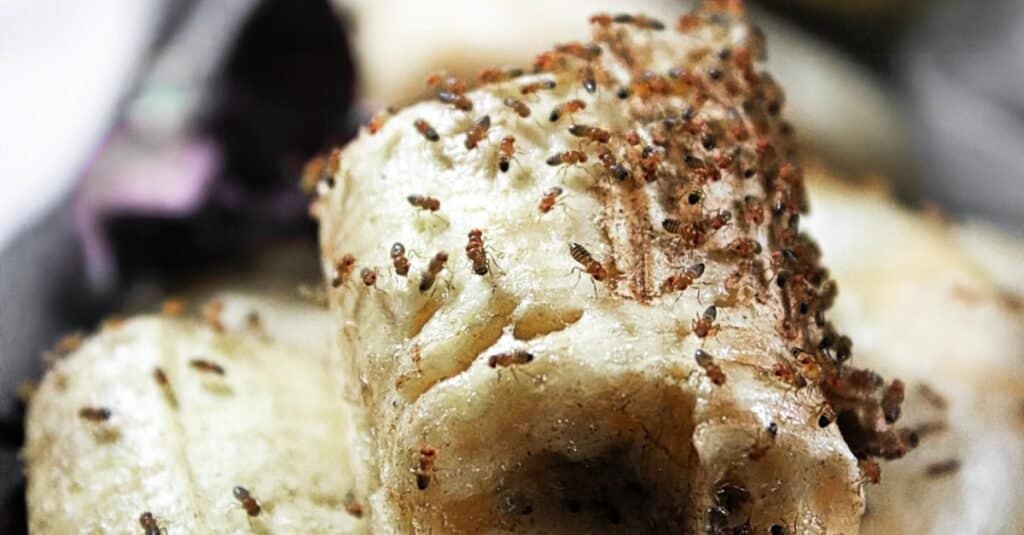
If you’re still spotting fruit flies in your home during the winter, it could be because your cozy indoor heating is also keeping them comfortable.
©iStock.com/Akchamczuk
Can Fruit Fly Eggs Survive Cold Weather?
Fruit flies in their immature stages – eggs and larvae – are not able to tolerate cold temperatures. This is much like their adult counterparts. When exposed to a temperature of 37F or lower for a continuous period of 15 to 18 days, any eggs or larvae present will inevitably perish. This is one of the reasons why fruit fly populations are lower in the winter season.
Do Fruit Flies Hibernate In The Winter?
While some animals, such as bats, turtles, and skunks, enter into a state of deep sleep during the winter season, flies have a different approach. Common fly species, including fruit flies, enter into diapause, a condition characterized by reduced metabolic activity that resembles hibernation.
When the temperature rises in the spring months, the flies’ appetite and development return to their typical levels.
The photo featured at the top of this post is © Arif_Vector/Shutterstock.com
FAQs (Frequently Asked Questions)
Can fruit flies make you sick?
Yes, fruit flies can potentially make you sick as they can carry harmful bacteria such as salmonella, E. coli, and listeria. These bacteria are known to cause food poisoning, and their presence in fruit flies can lead to severe illness, hospitalization, and even life-threatening conditions.
Does killing fruit flies attract more?
Killing a fly can indeed release pheromones that may attract more flies to the area. In fact, some farmers and pest control professionals use this knowledge to their advantage by creating traps that utilize pheromones to attract and capture flies.
How long do fruit flies live?
Fruit flies are recognized for their remarkable ability to reproduce quickly and have relatively brief life cycles. Typically, fruit flies have an average lifespan of about 40 to 50 days, during which they can produce numerous offspring.
What repels fruit flies?
It is believed that fruit flies have an aversion to strong odors and, as a result, can be repelled using certain fresh herbs in your kitchen. Some of the herbs that are considered effective in repelling fruit flies include lavender, mint, basil, and rosemary.
What temperature kills fruit flies?
Adults can be killed by exposure to very high temperatures above 100 degrees Fahrenheit, even if only for a short period of time. On the other hand, temperatures below 32 degrees Fahrenheit can also be lethal to fruit fliers.
Do humans share DNA with fruit flies?
Fruit flies share approximately 60 percent of their DNA with humans. It’s a remarkable similarity and one that has made fruit flies a valuable subject for scientific research. In fact, nearly three-quarters of the genes known to cause human diseases are also present in fruit flies.
Thank you for reading! Have some feedback for us? Contact the AZ Animals editorial team.



